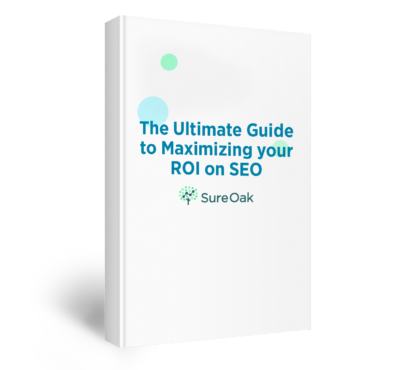The dynamic industry of FinTech, or financial technology, is continuously evolving, and its rapid growth requires companies to adapt quickly to stay ahead. Search engine optimization (SEO) plays an important role in helping FinTech companies gain online visibility and attract the right audience in this competitive sphere. As we step into 2024, it’s crucial for FinTech marketers to be aware of the latest SEO trends that should shape their digital marketing strategies.
In this comprehensive guide, we explore the top 10 SEO trends that will dominate the FinTech industry in 2024. We will also cover the importance of SEO for FinTech companies, its evolution over the years, and some key SEO FinTech examples, so you can be in the know. Continue reading to learn all about mastering your FinTech SEO strategy in 2024.
Why SEO is Important for FinTech Companies
In today’s digital age, SEO is essential for the success of businesses across industries. Yet, for the highly competitive industry of FinTech, specific SEO strategies are even more vital to ensure business success. SEO helps to make your FinTech company’s website easily discoverable by potential customers searching for financial solutions, services, or information. Ranking higher in search engine results pages (SERPs) also helps position FinTech organizations as authoritative and trustworthy, which is essential for companies that handle higher-stakes matters like finances.
Overall, SEO helps FinTech companies achieve these vital results:
- Boost visibility: SEO helps your website rank higher in search engine results pages (SERPs), making it more likely that users will find and click on your site.
- Attract targeted traffic: By optimizing for relevant keywords and user intent, you can attract potential conversions who are genuinely interested in your FinTech offerings.
- Build credibility: In the financial sector, trust is paramount. Users are more likely to engage with and trust businesses that appear at the top of search results.
- Increase conversions: SEO not only drives traffic but also focuses on improving the user experience and guiding visitors toward conversion points, such as signing up for a service or making a purchase.
- Gain competitive advantage: In a competitive industry like FinTech, gaining an edge over rivals is crucial. Effective SEO can give your company a competitive advantage by helping you outrank competitors and attract a larger share of the market.
- Reduce marketing costs: Compared to traditional advertising, SEO is a cost-effective marketing strategy. It can provide long-term results and generate organic traffic without the recurring expenses associated with paid advertising.
How Fintech SEO Has Changed Over the Years
Search engine optimization strategies in the FinTech sector have evolved significantly over the years. In the early days of SEO, keywords and backlinks were the main areas of focus to drive rankings. FinTech companies focused on identifying and optimizing for high-volume keywords relevant to their services to draw in traffic. Additionally, backlinks from authoritative websites were necessary for establishing website authority.
Though these focus areas are still required in modern SEO, changes in search engine algorithms, user behaviors, and technology have made FinTech SEO more complex. Modern FinTech SEO is a multifaceted approach that encompasses several new key elements.
Some of the noteworthy changes in FinTech SEO include:
- E-E-A-T and YMYL: Google introduced the concepts of E-A-T (Expertise, Authoritativeness, Trustworthiness) and YMYL (Your Money or Your Life) content in 2014. These guidelines emphasized the need for credible, trustworthy content from financial services companies, as content in this niche has a greater impact on users’ lives. In 2022, Google expanded the E-A-T criteria to E-E-A-T, or Experience, Expertise, Authoritativeness, and Trustworthiness, creating more comprehensive guidelines to follow.
- User experience focus: Search engines now place a strong emphasis on user experience. Factors like website speed, mobile responsiveness, and intuitive navigation directly impact rankings.
- Content relevance: Quality and relevance of content have become essential. Creating informative, valuable, and user-centric content is a top priority. FinTech websites have started producing more blog posts, guides, and videos to engage and educate their audience.
- Algorithm updates: Search engines regularly update their algorithms, including Google’s BERT and Core Web Vitals, affecting how websites are ranked. Staying up-to-date with these changes is essential for SEO success.
- AI and machine learning: The integration of AI and machine learning has revolutionized SEO, allowing for more precise targeting, personalization, and predictive analytics.
It’s clear that SEO in the FinTech industry is complex and rapidly evolving, so how can you stay ahead of the curve? Let’s delve into the top ten FinTech marketing trends that will shape the industry in 2024.
10 Fintech SEO Trends to Consider in 2024
Here are the top SEO trends for FinTech to consider implementing, as well as some examples of SEO for FinTech that you need to know about.
Use an effective content strategy for your target audience
Content is king for SEO. However, in 2024, it won’t just be about creating mass content—it will be about crafting an effective content strategy that speaks directly to your target audience. FinTech companies must identify their audience’s pain points, needs, and preferences and tailor their content accordingly.
An effective content strategy involves the creation of high-quality, informative, and engaging content that resonates with your target audience. This includes blog posts, in-depth guides, videos, infographics, and more. Relevant and well-optimized content not only attracts organic traffic but also helps improve your website’s search engine rankings.
To create an effective FinTech content development strategy, you should start by conducting thorough keyword research to identify relevant topics and search queries that your audience is looking for. Next, marketers create comprehensive, authoritative, and well-researched content on those topics. You then optimize your content for relevant FinTech keywords and ensure it’s high quality and provides value to the audience.
Once you’ve shared high-quality, optimized content with your audience, use analytics tools to measure your content’s success, and adjust accordingly. You should also regularly update and refresh existing content to maintain its relevance.
Implement Schema Markups
Schema markups are code snippets added to your website’s HTML that provide search engines with valuable information about the content on your website. Schema markups are a powerful tool for enhancing your FinTech website’s visibility in search results. They help search engines understand and display your content in a more informative way, leading to ‘rich snippets’ in search results.
Rich snippets are the snippets of information you see paired with each search engine result. The more snippets of useful information for your website page, the better. This information tells users more about your page, improving click-through rates. It also helps search engines understand the content better, potentially leading to higher rankings for relevant queries.
Identify the types of rich snippets that are relevant to your FinTech product or services, such as pricing, category, reviews, or other useful information that you want users to see. You can then create and add schema markup code to your website’s HTML for relevant pages. Once implemented, test the markup using Google’s Structured Data Testing Tool to ensure it’s implemented correctly.
Google walks you through exactly how to implement schema markups and achieve rich snippets, as well as how to generate structured data with JavaScript.
Leverage AI and Machine Learning
In 2024, the integration of AI and machine learning into SEO strategies is expected to reach new heights. AI and machine learning in SEO involves the use of algorithms and data analysis to automate and optimize various aspects of search engine optimization. AI can analyze user behavior, predict trends, and personalize content for individual users. Additionally, machine learning algorithms can optimize website content based on user preferences and search patterns, ultimately improving SEO rankings.
The valuable insights and optimization capabilities of new AI technology should be used to your advantage as a FinTech marketer. There are numerous ways you can utilize these new tools, such as by implementing AI-powered tools and platforms that provide insights into user behavior and content optimization. For example, tools with machine learning algorithms can conduct automatic keyword research and recommendations based on your audience’s data.
As for optimizing your website, AI tools like AI chatbots can improve customer support and engagement, increasing the amount of time users stay on your website. Similarly, AI technology can provide personalized product recommendations to increase conversions. Furthermore, AI tools can give recommendations for optimizing your website or even automatically integrate these changes.
Please keep in mind that AI on its own is risky. Human monitoring, revisions, and overall review are critical. Adding your brand’s messaging, voice, and tone are not strongpoints of AI and still require a human touch.
Consider EEAT for YMYL
FinTech websites often deal with YMYL or Your-Money-Your-Life content, which includes information that can significantly impact users’ financial stability or health. YMLY is a content organization and ranking system created by Google, and sites in this category are ranked using stricter guidelines.
For web pages categorized as YMYL, Google then uses its E-E-A-T (formerly E-A-T) ranking system to rank your content in search engine results pages (SERPs). E-E-A-T stands for Experience, Expertise, Authoritativeness, and Trustworthiness. Google places a higher emphasis on these qualities in FinTech and other YMYL content due to its more sensitive nature.
For FinTech companies, establishing E-E-A-T is crucial. Otherwise, you will not rank in search engines, and it will be more difficult to gain trust from your audience.
Here are some ways to improve your E-E-A-T scores:
- Feature expert authors and contributors on your website.
- Provide clear and transparent disclosures about your financial services and products.
- Acquire authoritative backlinks from trusted sources within the finance industry.
- Avoid clickbait and fluff content.
- Regularly update your content so it remains relevant and credible.
Optimize for Core Web Vitals
User experience is a pivotal factor in SEO rankings, and Google’s Core Web Vitals take center stage in this regard. Core Web Vitals are a set of user-centric metrics that assess the performance and overall user experience of a website. These metrics measure a website’s loading speed, interactivity, and visual stability.
In 2024, users will only expect better-performing websites as technology improves. Optimizing for Core Web Vitals ensures that your website provides a smooth and pleasant user experience, which can in turn lead to improved search engine rankings. Fortunately, Google makes it easy to check and adjust your Core Web Vitals. You can run a free Core Web Vitals report and gain insights on how to improve your website’s functionality.
Commonly, improving your Core Web Vitals takes the form of optimizing images and code, minimizing layout shifts, and increasing mobile friendliness. These adjustments help your website pages and buttons load faster and overall meet industry standards and audience expectations.
Take Advantage of Video
Video content is gaining prominence online, and FinTech marketers can leverage it to engage users and explain complex financial concepts effectively. In 2024, video content will be used to help improve SEO by increasing user engagement, extending time spent on your website, and attracting backlinks. Video content also provides an opportunity to rank in video search results.
As with other SEO content, your video content will need to be high-quality, authoritative, and provide value to have beneficial effects. Start by creating quality-over-quantity, informative videos that address common financial concerns and offer solutions. As per SEO guidelines, make sure to optimize the video metadata, including titles, descriptions, and tags.
You should also provide transcripts for videos to make the content accessible and indexable by search engines.
Organize Content into “Clusters” or “Silos”
Content organization will be even more critical for FinTech websites next year. Grouping related content into “clusters” or “silos” is a proven SEO tactic that enhances user navigation and helps search engines understand your content’s structure and relevance. As search engines can better understand the relationships between pages on your website, your pages may rank higher in SERPs.
For your FinTech website, first, identify the key topics and subtopics present on your site. Then, create a simple navigation structure that contains broad topics and subtopics (i.e. Blog -> Topics). By linking your topics or articles to a pillar page, you create a hierarchical structure that is easier for both users and search engines to navigate.
Answer the Right Questions and Meet User Intent
As the competitiveness in SERPs grows in 2024, aligning your content with user intent will be even more important. User intent refers to the underlying purpose or goal a user has when conducting a search query. The four main types of user intent are informational, navigational, transactional, or commercial. Aligning your content with user intent means creating content that directly addresses user needs and provides valuable solutions. This enhances SEO by increasing relevance and user engagement.
For example, if a user clicks on your page that contains a clickbait title, and immediately recognizes this and leaves your page, this increases your ‘bounce rate.’ In turn, search engines recognize that users are less likely to spend time on your site, decreasing your rankings. Conversely, if your page answers or provides what it promises in the title and description, users will stick around longer. This shows search engines that your site provides value to users, improving your rankings.
To align with user intent, you first want to know the questions they’re asking. Conduct research on FinTech keywords to identify specific queries and the intent behind them. Then, create content that matches the intent, whether it’s informational blog posts, product pages, or guides. Focus on providing valuable information and solving user problems within your niche rather than creating fluff.
Strategic Linking and Outreach
Backlinks will remain a fundamental element of SEO in 2024. FinTech companies should invest in building a diverse and high-quality linking portfolio. A strong linking portfolio signals to search engines that your content is trustworthy and authoritative. A linking portfolio consists of both internal and external links that point to and from your website. High-authority backlinks from reputable sources are particularly valuable, helping to boost your site’s credibility and gain new audience members.
This year, consider collaborating with reputable financial websites and blogs for guest posting opportunities. Fostering relationships with social media influencers in the finance and technology sectors who can provide backlinks is another excellent tactic. As for your internal links, make sure they are strategically used and structured to guide users around your website.
Consider Additional Advertising
While organic SEO is essential, paid advertising can complement your efforts and provide immediate visibility, especially in highly competitive FinTech niches. Online paid advertising typically involves running targeted pay-per-click (PPC) campaigns on platforms like Google Ads, social media, and other advertising networks.
Though organic rankings should also be a long-term focus, paid advertising brings immediate lead generation and results that may also be necessary. Search engines like Google and Bing make it easy to set up and manage targeted PPC campaigns on platforms that are relevant to your audience. You can then monitor and analyze the performance of your campaigns to maximize your ROI.
Grow with SEO in 2024
With emerging technologies, search engine algorithms, and digital trends developing, SEO in the FinTech industry is bound for substantial changes in 2024. By embracing these top SEO for finance trends, from crafting an effective content strategy to harnessing the power of AI and machine learning, FinTech companies can remain ahead of the curve in this highly competitive field.
Ranking as a credible organization on search engine results pages is vital in the FinTech industry. Thus, outsourcing your SEO strategies to the experts is a worthy investment. At Sure Oak, we guide you through mastering your organic and paid SEO strategy to drive results. Contact us for a free strategy session today to get started.





